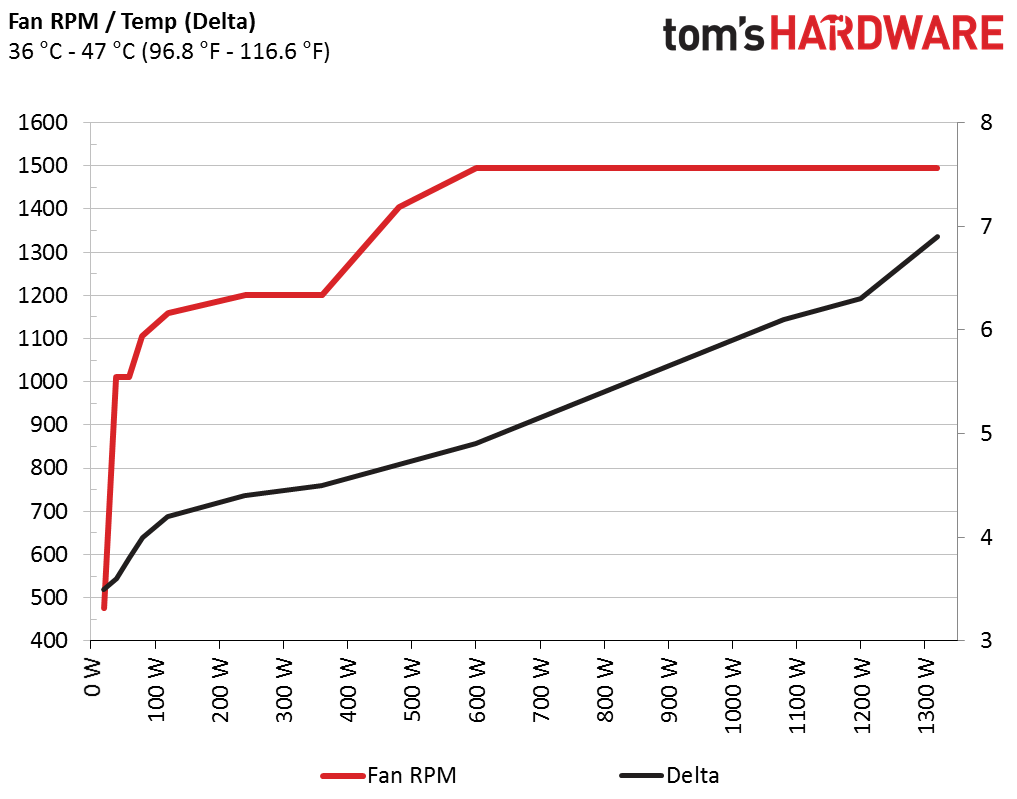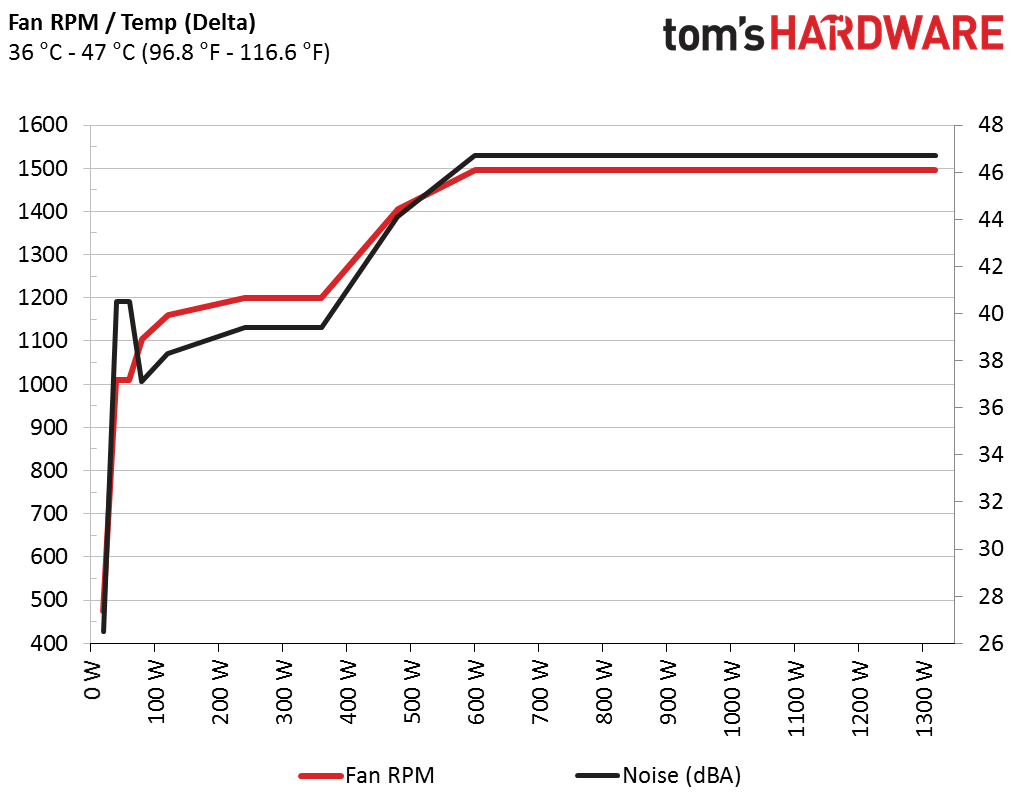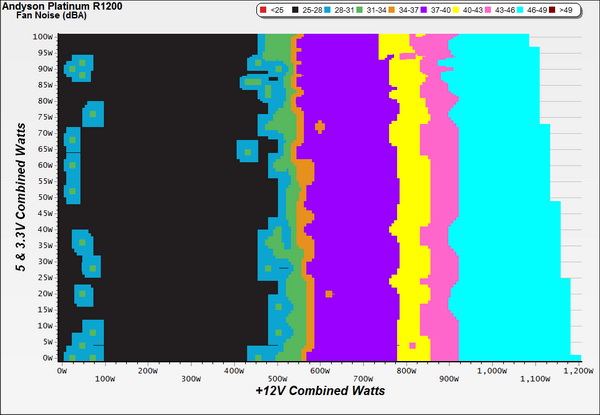Andyson Platinum R1200 Power Supply Review
Why you can trust Tom's Hardware
Efficiency, Temperatures And Noise
Our efficiency testing procedure is detailed here.
Efficiency
Using the previous page's results, we plotted a chart showing the efficiency of the R1200 at low loads and loads equal to 10 percent to 110 percent of the PSU's maximum rated capacity.
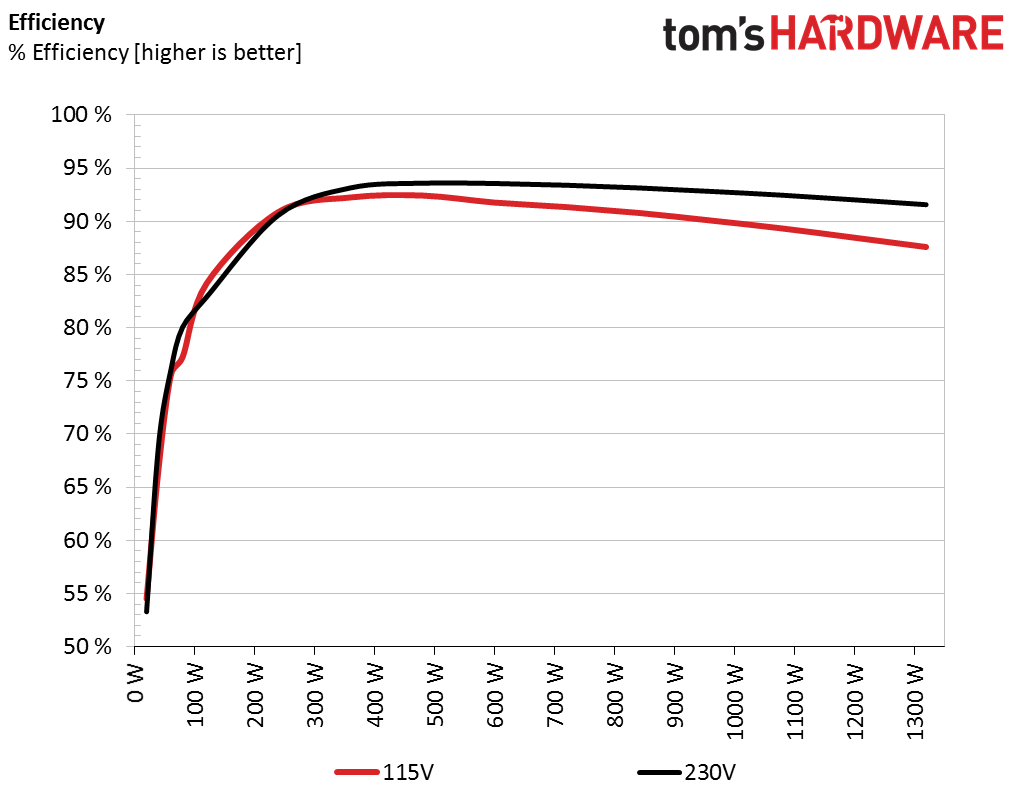
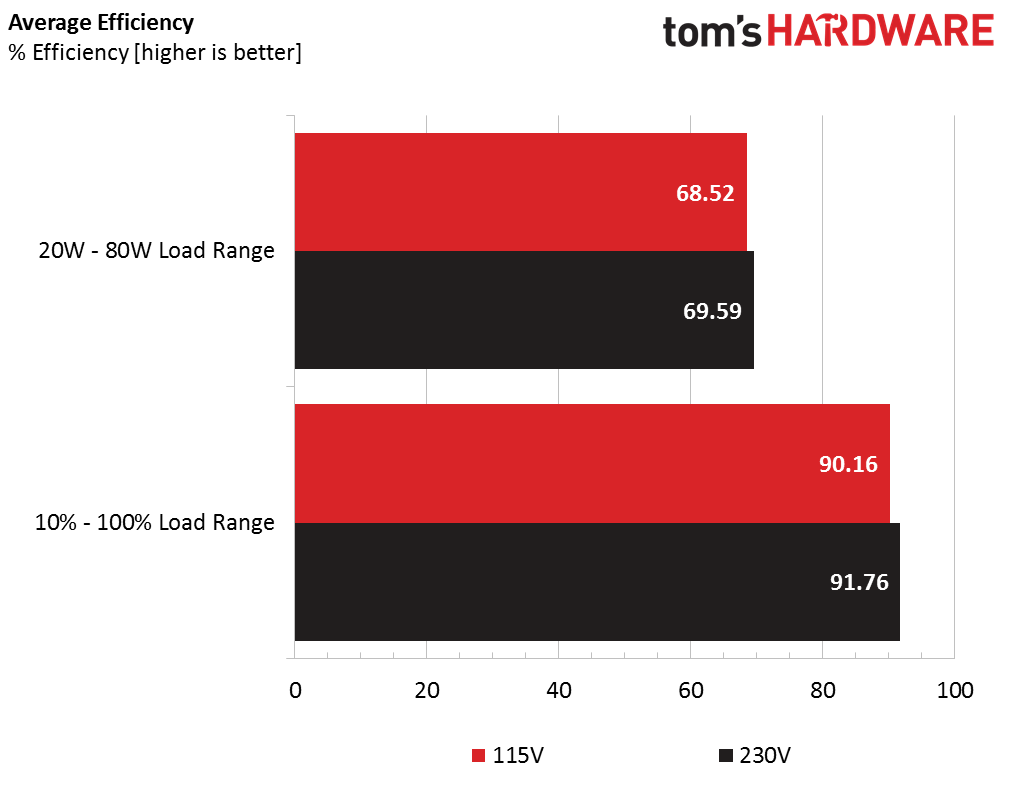
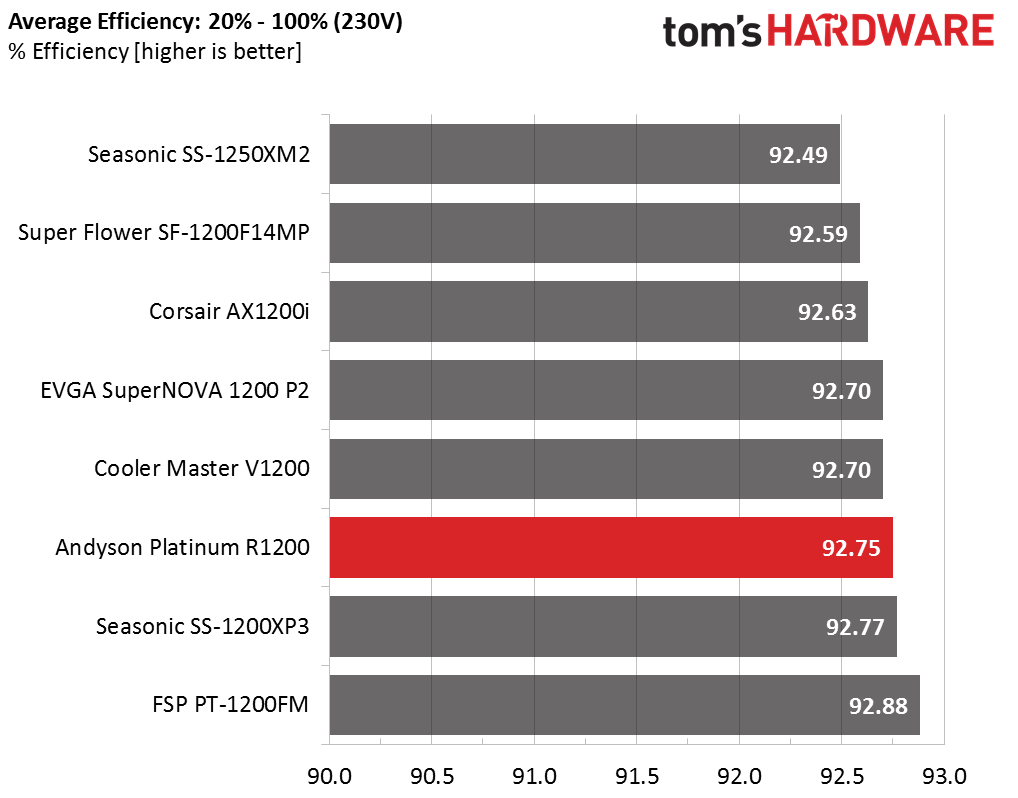
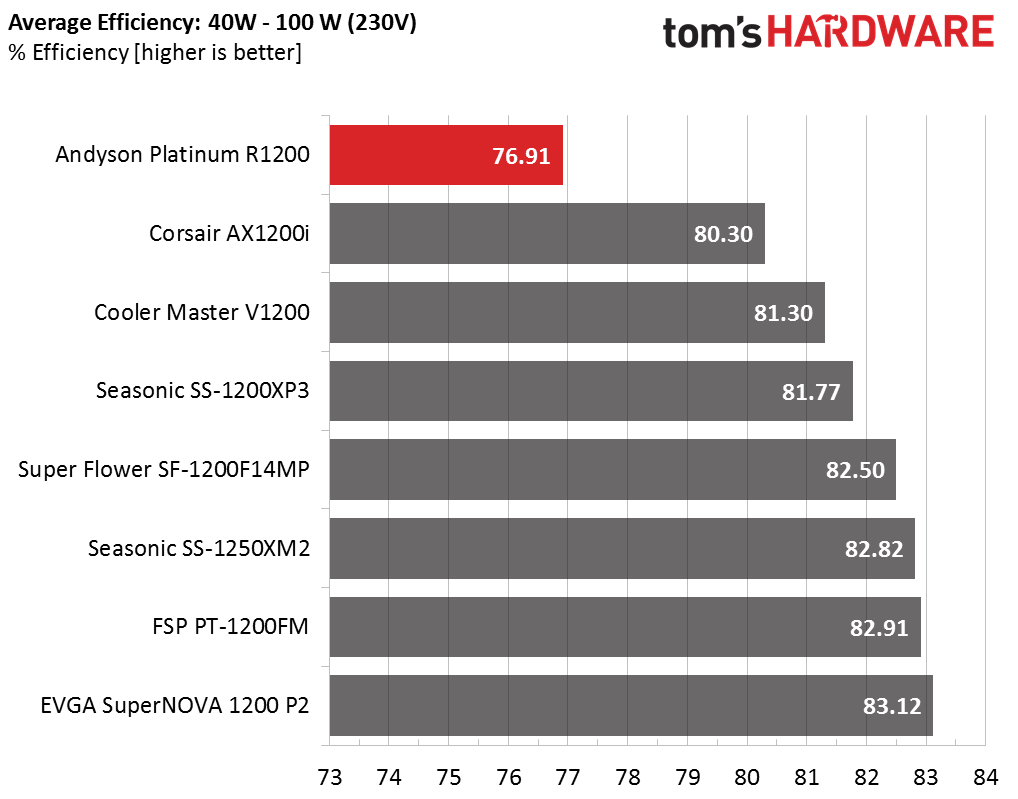
In a normal load range, this unit takes third place, just behind the first two PSUs. However, the placement changes in the low-load tests, where the high-end R1200 finishes last. Obviously, Andyson tunes for efficiency with greater-than 100W loads and accepts poor efficiency in less taxing scenarios. Modern systems idle at low loads though, so we think the company should address this shortcoming in its next revision. The difference in energy savings could be noticeable with better efficiency there.
Efficiency at Low Loads
In the next tests, we measure the R1200's efficiency at loads significantly lower than 10 percent of the device's maximum capacity (the lowest load the 80 PLUS standard measures). The loads we dialed were 20, 40, 60 and 80W. This is important for representing when a PC is idle with power-saving features turned on.
| Efficiency at Low Loads | |||||||||
|---|---|---|---|---|---|---|---|---|---|
| Test | 12V | 5V | 3.3V | 5VSB | DC/AC (W) | Efficiency (%) | Fan Speed (RPM) | Fan Noise (dBA) | PF/AC (V) |
| 1 | 1.197A | 0.491A | 0.472A | 0.195A | 19.59 | 54.51 | 475 | 26.5 | 0.837 |
| 12.142V | 5.055V | 3.372V | 5.051V | 35.94 | 115.1 | ||||
| 2 | 2.426A | 0.979A | 0.977A | 0.394A | 39.68A | 66.82 | 1010 | 40.5 | 0.916 |
| 12.14V | 5.053V | 3.37V | 5.048V | 59.38 | 115.1 | ||||
| 3 | 3.657A | 1.475A | 1.481A | 5.043A | 59.81A | 75.49 | 1010 | 40.5 | 0.91 |
| 12.138V | 5.05V | 3.369V | 5.043V | 79.23V | 115.0 | ||||
| 4 | 4.872A | 1.983A | 1.956A | 0.79A | 79.71A | 77.25 | 1105 | 37.1 | 0.917 |
| 12.137V | 5.048V | 3.369V | 5.039V | 103.19V | 115.0 |
We would like to see greater efficiency levels at low loads, especially from a Platinum-class unit.
Something else that caught our attention was the fan's noise during our 40 and 60W load tests, compared to the 80W run when it was spinning faster. This isn't the first time we've noticed this, and it has to do with the operation of some ball-bearing fans, which can produce a louder-than-normal noise at certain low voltages due to mechanical vibrations.
5VSB Efficiency
The ATX specification states that 5VSB standby supply efficiency should be as high as possible, recommending 50 percent or higher efficiency with 100mA of load, 60 percent or higher with 250mA of load and 70 percent or higher with 1A or more of load.
Get Tom's Hardware's best news and in-depth reviews, straight to your inbox.
We will take four measurements at 100, 250 and 1000mA, and one under the highest load the 5VSB rail can handle.
| 5VSB Efficiency | ||||
|---|---|---|---|---|
| Test | 5VSB | DC/AC (W) | Efficiency(%) | PF/AC (V) |
| 1 | 0.102A | 0.51 | 72.86 | 0.056 |
| 4.960V | 0.70 | 115.4 | ||
| 2 | 0.252A | 1.25 | 76.69 | 0.123 |
| 4.954V | 1.63 | 115.4 | ||
| 3 | 1.002A | 4.93 | 79.52 | 0.280 |
| 4.923V | 6.20 | 115.4 | ||
| 4 | 3.002A | 14.54 | 77.22 | 0.438 |
| 4.842V | 18.83 | 115.2 |
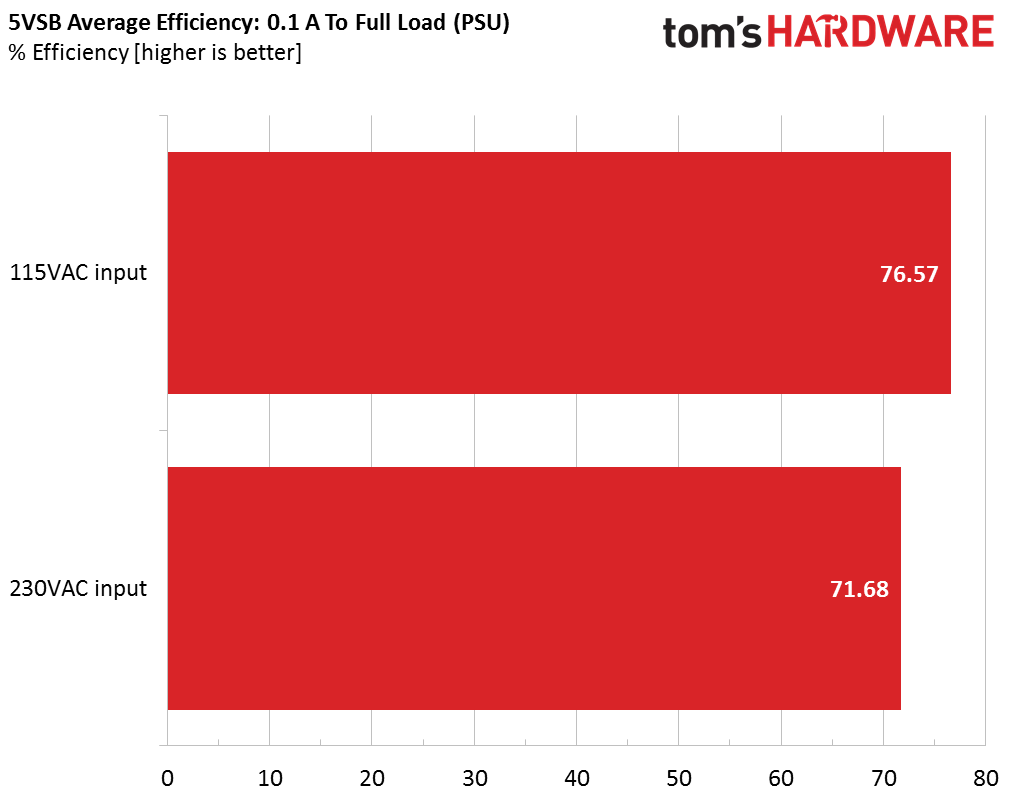
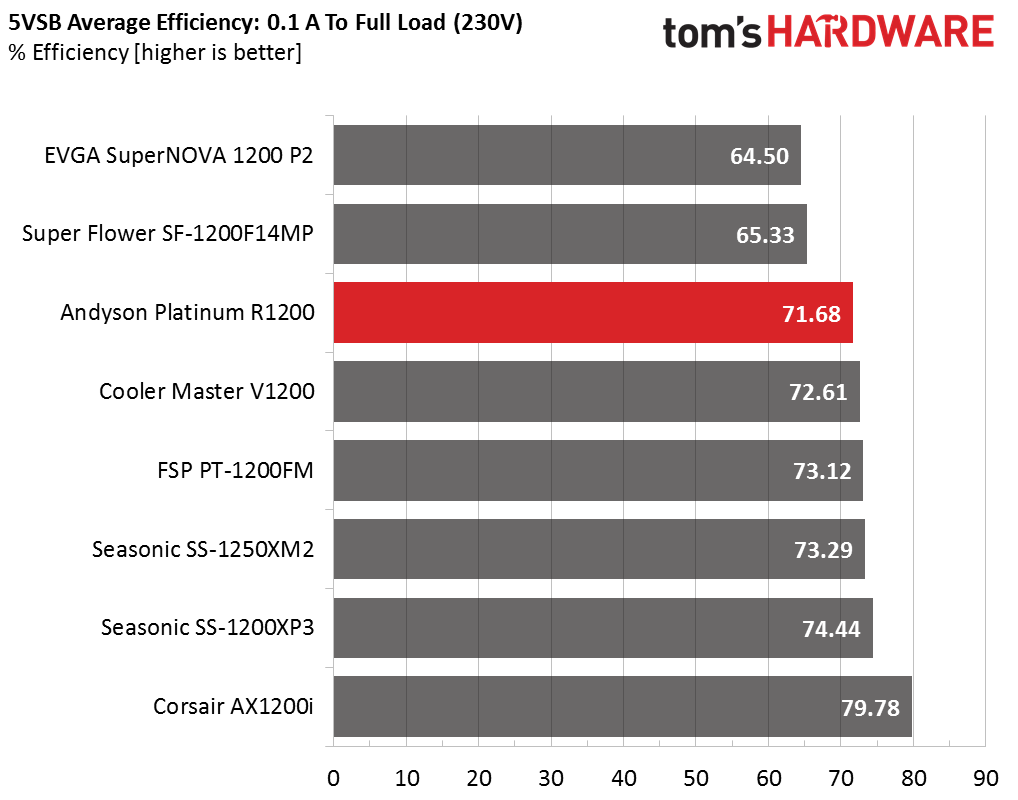
The Andyson unit performs well in the first three tests. However, under a full load, the efficiency drops significantly compared to the 1A test, showing that 3mA of load stresses this rail enough, leading to the efficiency fall-off.
Power Consumption in Idle And Standby
| Mode | 12V | 5V | 3.3V | 5VSB | Power (AC) | PF/AC Volts |
|---|---|---|---|---|---|---|
| Idle | 12.148V | 5.055V | 3.373V | 5.054V | 7.7W | 0.37 |
| 115.5V | ||||||
| Standby | Row 2 - Cell 1 | 0.07W | 0.006 | |||
| 115.4V |
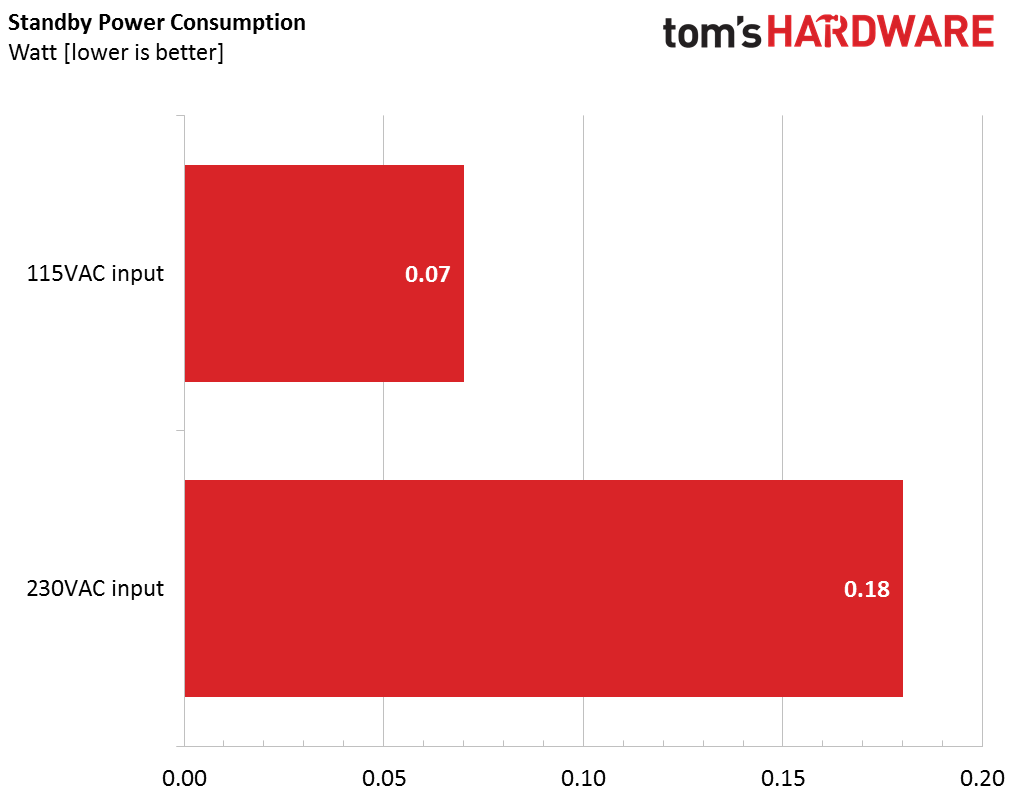
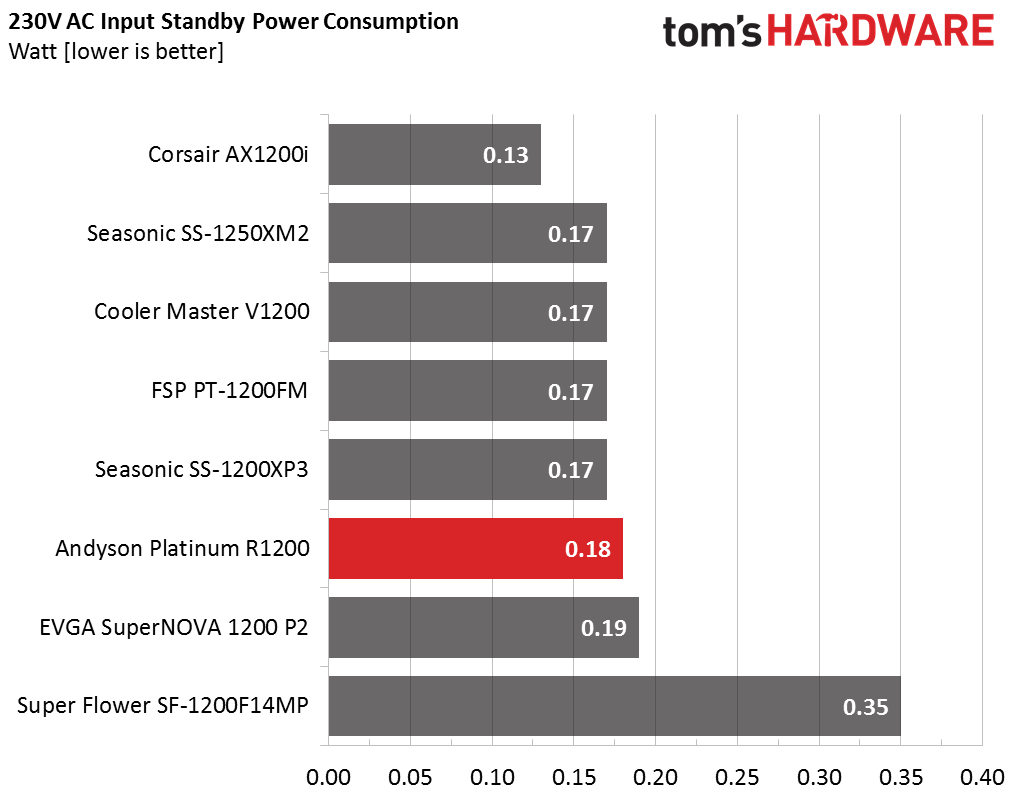
In the table above, you'll find the power consumption and voltage values of all rails (except -12V) when the PSU is in idle mode (powered on, but without any load on its rails), along with power consumption when the PSU is in standby mode (without any load at 5VSB).
In standby, the PSU has low energy demands, meeting the ErP Lot 6 2013 requirements with ease. This is essential for any PSU sold in the EU zone (and since the majority of PSUs are available in all regions, manufacturers pay extra attention to the EU directive).
Our mixed noise testing is described in detail here.
Fan RPM, Delta Temperature And Output Noise
The following chart illustrates the cooling fan's speed (RPMs) and the delta between input and output temperature. The results were obtained at 36 to 47 °C ambient temperature.
The fan profile is very aggressive under tough conditions. As you can see in the corresponding chart, the fan almost immediately jumps to 1000 RPM, and at around 600W of load it engages to full speed. On the contrary, the delta difference between the unit's air input area, the fan grill and the exhaust is low, showing that either the fan doesn't do a good enough job, or simply that the internal heat dissipation is kept low due to the Platinum-class efficiency.
The next chart shows the cooling fan's speed (RPMs) and output noise. We measured acoustics from one meter away, inside a small, custom-made anechoic chamber with internals completely covered in soundproofing material (be quiet! Noise Absorber Kit). Background noise inside the anechoic chamber was below 18 dB(A) during testing, and the results were obtained with the PSU operating at 36 to 47 °C ambient temperature.
At close to 1000 RPM, the fan generates more noise than expected (something we've already noted in ball-bearing fans). There is also a region where lower speeds can cause vibrations, which inevitably affect the output noise. This is because most fans used in PSUs aren't designed solely for operation at very low speeds. Thus, when they are fed low voltages, they can show a strange behavior.
The following chart illustrates the fan's output noise over the PSU's entire operating range. The same conditions of the above chart apply to our measurements, though the ambient temperature was between 28 and 30 °C.
Under normal conditions, the PSU features quiet operation; only with 800W load and up does the fan start to output noticeable noise. Although it lacks a semi-passive mode, at up to 500W the PSU's noise output is highly restricted and likely won’t bother you.
Current page: Efficiency, Temperatures And Noise
Prev Page Load Regulation, Hold-Up Time And Inrush Current Next Page Cross-Load Tests And Infrared Images
Aris Mpitziopoulos is a contributing editor at Tom's Hardware, covering PSUs.
-
blackmagnum Thank you for the read. Did you know that the power feeding this PSU can instead be fed into 3 normal sized machines? The power of choice is yours to make, but electricity will not be infinite.Reply -
iam2thecrowe Teapo capacitors are a hit and miss. I'd say if your running it 24/7 as a coin mining machine with high load it would not last 10 years. For normal use with a few hours gaming per day it might be ok, but 10 years is a long shot for even the best capacitors not to have some degradation.Reply -
daglesj Can we have some reviews of really high quality 300-600W PSUs? You know the ones that 90% of us here would actually use/need.Reply -
vrumor ReplyThank you for the read. Did you know that the power feeding this PSU can instead be fed into 3 normal sized machines? The power of choice is yours to make, but electricity will not be infinite.
Did you know that anyone who cares about this PSU, isnt going to be thinking about the 3 400w HTPCs that it could run. Keep your politics out of a PSU review lol. -
rolli59 Always nice to see reviews of the high end stuff but really the 300-850watt range will cover the needs of 99% of readers of the side.Reply
Now lets see if Andyson can follow up and start putting out decent lower power units. -
damric Andyson, the notorious RAIDMAX OEM. Not sure any sane person would pick you for a high end PSU, but thanks for trying.Reply
-
iam2thecrowe ReplyCan we have some reviews of really high quality 300-600W PSUs? You know the ones that 90% of us here would actually use/need.
i disagree, can we get a roundup of complete rubbish generic psu's like low end radimax and the like and watch them burn! i think it needs to be done to show people what not to buy. -
damric Reply15588307 said:15588123 said:Andyson, the notorious RAIDMAX OEM. Not sure any sane person would pick you for a high end PSU, but thanks for trying.
is it andyson's fault that raidmax wants them to supply cheap PSU?
Yes, absolutely. Same with other OEMs like Channel Well that know how to make good PSUs but instead churn out cost-cutting junk because that's the best contracts that they can win. I am not forgiving when it comes to PSUs.
